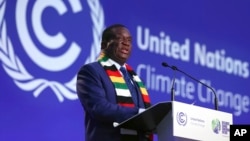President Emmerson Mnangagwa says the West should remove targeted sanctions imposed on the ruling Zanu PF elite, claiming that the restrictive measures are impeding the implementation of climate change programs.
Mnangagwa made these remarks today at the ongoing 2021 United Nations Climate Change Conference in Glasgow, Scotland.
In a series of tweets, Information Secretary Nick Mangwana quoted Mnangagwa as saying, “Zimbabwe has set an ambitious objective of reducing carbon emissions by 40% per capita by 2030. The removal of illegal sanctions which have been imposed on my country will go a long way in helping to enable the achievement of this target.”
“Zimbabwe has not been spared from climate change challenges which have led to increasing frequencies of severe droughts and cyclone-induced floods. These, coupled with the economic sanctions imposed on us and the Covid-19 pandemic, have had negative impacts on the livelihoods of the people of my country.”
Mnangagwa also said it is “most unfortunate that the impact of climate change is disproportionately borne by vulnerable communities that have contributed the least to the current stock of atmospheric carbon. Vulnerable countries must therefore be capacitated to adapt and build resilience …”
Opponents of his government claim that Zimbabwe has been crippled over the years by mismanagement, human rights abuses and rampant corruption.
At the United Nations Climate Change Conference, Mangwana said Zimbabwe has some specific programs for tackling global warming.
“Of the countries at #COP26 Zimbabwe has one of the most ambitious targets to reduce carbon emissions by 40% by 2030. This is in spite of being a net carbon sink Nation.”
He said Zimbabwe’s current emission mitigation plans in the energy sector include the reduction of transmission loss from 18% to 11% by 2025, expansion of solar to 300MW by 2025, addition of 4.1MW biogas capacity by 2024, 12% efficiency saving in agriculture by 2030 and 8% efficiency savings in mining.
Mangwana further noted that Zimbabwe’s response to reducing greenhouse gases also include the introduction of carbon tax on all fuel, diesel and petrol imports, to ensure the importation of fuel with ethanol, and the protection of the country’s national parks and wetlands, which act as carbon sinks.
He said there is need for financial resources for Zimbabwe and other developing nations to achieve these goals.




